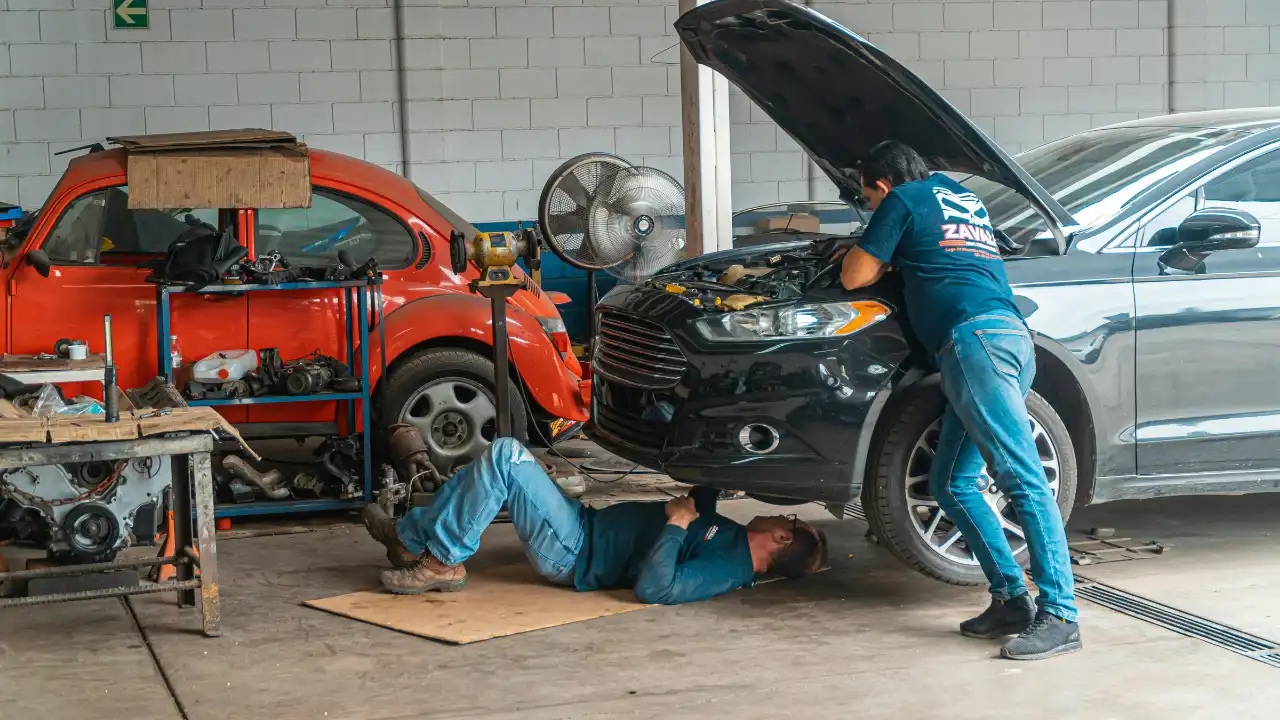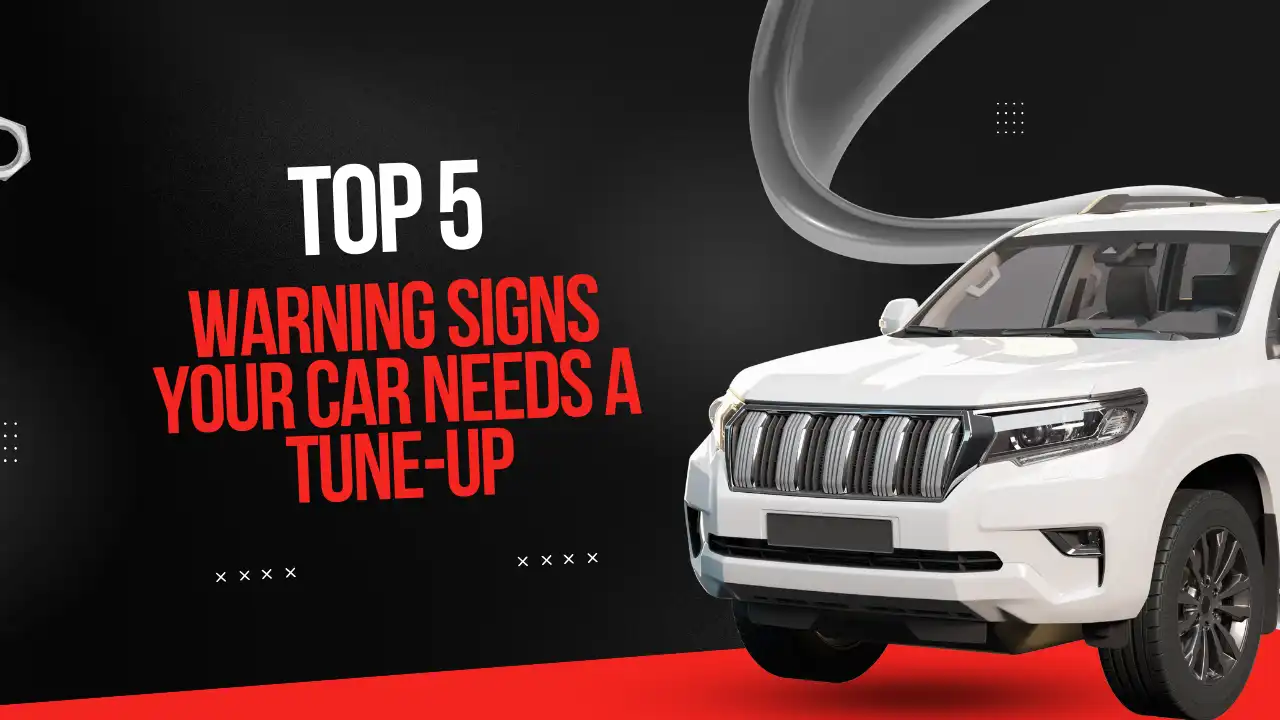Your car usually tells you when something’s wrong; you just have to listen. I’ve seen it time and again: people ignore little red flags, and next thing you know, they’re stuck on the side of the road, calling for a tow. The truth is, a lot of major car troubles can be avoided with something as simple as a tune-up. But how do you know when it’s time?
Let’s walk through the top 5 warning signs your car needs a tune-up so you can stay ahead of costly repairs and keep your ride smooth and safe.
Signs Your Car Needs a Tune-Up
A tune-up helps your engine run better, last longer, and burn less fuel. If you notice any of these signs, it likely means parts like spark plugs, filters, or ignition coils need attention.
Your Dashboard is Trying to Tell You Something
When those little warning lights pop up on your dashboard, they aren’t just suggestions; they’re your car’s way of saying, “Help me out!” The check engine light, oil light, or any blinking icon should never be ignored.
Modern cars use sensors to detect issues early, and a tune-up is often the fix. Even if the car seems to drive fine, what’s happening under the hood could be telling a different story. Catching it early can save you from breakdowns and expensive damage.
Struggling to Start or Random Stalls
If your car takes a few tries to start or it suddenly stalls at a stoplight, that’s a big red flag. These symptoms often point to worn spark plugs, failing ignition components, or clogged fuel filters.
One of my friends kept brushing off his car’s slow starts until it completely died on him during rush hour. A quick tune-up fixed it, but it could’ve been avoided altogether. A slow crank or frequent stalls usually mean your engine isn’t getting what it needs to run smoothly.
You’re Burning Through Gas Faster Than Usual
A sudden drop in fuel efficiency is more than just annoying; it’s often a sign your engine isn’t running as cleanly or efficiently as it should. This could be due to dirty air filters, worn-out spark plugs, or even a malfunctioning oxygen sensor. These small components directly affect how your engine breathes and burns fuel.
Here’s how it works: when your engine has to work harder to perform basic tasks, it ends up using more fuel. You might find yourself filling up more often, even though your driving habits haven’t changed.
Let me share something from my own experience. A few years ago, I noticed I was hitting the gas station more often. At first, I thought it was just traffic or maybe my tires. But after checking my average miles per gallon, I realized I was losing fuel efficiency fast. Turned out my spark plugs hadn’t been replaced in years. A quick tune-up made a noticeable difference and saved me a lot on gas.
Here’s a quick breakdown of how common issues impact your fuel usage:
| Component | How It Affects Fuel Economy |
| Dirty Air Filter | Restricts airflow, engine works harder |
| Old Spark Plugs | Causes misfires, reduces combustion power |
| Faulty O2 Sensor | Sends wrong data to engine, wastes fuel |
| Low Tire Pressure | Increases rolling resistance |
If you’re seeing your fuel go faster than it used to, it’s time to check under the hood.
Shaky, Noisy, or Off-Balance Driving
When your car feels “off” while driving, whether it’s shaking, making strange noises, or pulling to one side, it’s not just uncomfortable. These are signs that something’s not right mechanically, and they often mean your vehicle is overdue for a tune-up.
Common Signs You Shouldn’t Ignore
- Vibrations while idling or driving
This might feel like your steering wheel is buzzing or the entire car is trembling slightly when stopped. Often caused by misfiring spark plugs or issues with the engine timing. - Unusual noises
Clicking, whining, knocking, or hissing sounds under the hood can point to a range of issues, loose belts, worn engine parts, or dirty injectors. These sounds don’t fix themselves and often worsen over time. - Rough or uneven idling
If your car’s RPM needle bounces or the engine seems to struggle to maintain a steady rhythm, it’s likely a tune-up issue. This could mean your ignition system or fuel delivery needs attention. - Pulling or drifting while braking
While this could relate to the brakes or alignment, it sometimes connects back to uneven engine power or poor timing, issues that can be caught during a thorough tune-up.
Why These Issues Matter
Even if the car still drives, these symptoms mean it’s not performing efficiently. And inefficient driving leads to more stress on the engine, higher fuel consumption, and long-term wear that can shorten your car’s lifespan.
A tune-up checks these systems in detail, ensuring that timing, airflow, fuel mixture, and spark are all working in sync. Think of it like recalibrating your engine to its best self.
What You Can Do
- Don’t wait until it gets worse.
- Track symptoms like how often the noise or shake happens.
- Ask your mechanic for a full diagnostic during your next oil change or inspection.
Getting these signs checked early can save you hundreds, or even thousands, down the line. A car that’s smooth, quiet, and responsive is almost always a well-maintained one.
Power Loss and Sluggish Acceleration
Feeling Like Your Car is Dragging?
When your car feels sluggish, especially during acceleration, it usually points to a deeper issue. That lag you feel when you hit the gas pedal is often a warning that your engine isn’t getting the right mix of fuel, air, or spark. A healthy engine should respond almost instantly when you accelerate. If it hesitates or feels like it’s dragging, a tune-up could be the fix.
This power loss doesn’t just affect driving comfort. It can also impact your ability to merge onto highways, pass other vehicles safely, or even climb hills efficiently. If your car once felt zippy and now feels like it’s struggling to keep up, it’s time to investigate.
What’s Really Going On Under the Hood
There are several reasons behind reduced power, most of which are directly addressed during a tune-up. Worn spark plugs, for example, can cause incomplete combustion, meaning your engine isn’t firing as it should. Old ignition coils may fail to provide enough voltage to the plugs, leading to weak or inconsistent power.
Fuel system issues are also common. Dirty fuel injectors or a clogged fuel filter can restrict how much fuel gets to your engine, causing poor throttle response. Sometimes, it’s a combination of minor issues that add up, making your car feel underpowered and inefficient.
Why You Shouldn’t Ignore It
Many drivers brush off sluggish acceleration as “just getting older,” especially if the car still gets them from point A to B. But the reality is that this early loss of power often leads to more serious problems. If your engine is straining to do basic tasks, it’s working harder than it should, and that shortens its life.
A regular tune-up doesn’t just improve performance. It helps your engine run cleaner, cooler, and with less stress. That small investment now can prevent major repairs later, not to mention improve your fuel economy and overall driving experience.
If you’re noticing a lack of pep, especially when you press the gas, it’s your car’s way of saying it needs attention. Give it the care it needs, and it’ll repay you with better performance and peace of mind.
When Local Driving Habits Make Things Worse
The Hidden Strain of Everyday Driving
Most drivers assume tune-up needs only come from extreme conditions, but everyday habits and typical city driving can quietly wear your car down. Frequent short trips, sitting in traffic, and lots of stop-and-go movement place more strain on your engine than many realize. Every time you accelerate, brake, and idle repeatedly, your car’s components are being put to work, and if they’re already slightly worn, the damage adds up faster.
Even the weather can play a part. High temperatures can increase engine heat, while cold starts in winter take a toll on the battery and ignition system. These daily conditions quietly chip away at your vehicle’s performance, often speeding up the timeline for when a tune-up is truly needed.
How These Habits Affect Your Car’s Health
Constant braking and acceleration wear out spark plugs and fuel injectors quickly than highway cruising. Dirty air from traffic-heavy environments can clog filters faster. If your car’s components are already borderline, these habits push them over the edge. You might not notice it right away, but slowly, you’ll feel that loss of smoothness, hear new noises, or see your gas mileage dip.

Some people are surprised to learn that short trips are among the worst offenders. On short drives, the engine doesn’t have time to fully warm up, which can cause condensation buildup in the engine oil, affecting lubrication and long-term engine health. Combined with traffic and urban driving stress, it’s no wonder many cars start acting up sooner than expected.
Why Being Proactive Makes a Difference
A tune-up isn’t just about fixing problems; it’s about preventing them. When you drive under more demanding conditions, even if it doesn’t seem extreme, your vehicle requires more frequent checks and adjustments. Filters may need changing sooner, spark plugs may wear out faster, and sensors might need recalibration.
Being aware of how your everyday driving affects your car helps you stay ahead of problems. It’s not about being paranoid, it’s about being practical. Scheduling regular tune-ups based on how and where you drive, not just mileage alone, ensures your engine keeps performing at its best, no matter how hectic the road gets.
When and Where to Get a Tune-Up
Recognizing the Right Time
Knowing when to schedule a tune-up doesn’t have to be complicated. It’s less about the exact mileage and more about how your car feels and performs. While many older vehicles had strict intervals for maintenance, today’s cars rely heavily on sensors and real-time performance data. That said, most modern vehicles benefit from a tune-up roughly every 30,000 miles, but this number can vary based on how you drive and the environment you drive in. According to EPA regulations, test vehicles historically allow a minimum of three major engine tune-ups at intervals of approximately 12,500 miles
If your car starts showing any of the warning signs we’ve talked about, like poor fuel efficiency, hesitation during acceleration, strange sounds, or a rough idle, it’s time to take action. These symptoms are your car’s way of flagging an internal imbalance, and waiting too long can turn small issues into expensive repairs.
Choosing the Right Mechanic
Finding a trustworthy mechanic is just as important as recognizing the signs. A proper tune-up requires more than just swapping spark plugs or changing an air filter. It involves a thorough inspection of your engine, ignition, and fuel systems to ensure everything is working in sync.
Look for a shop that takes the time to explain what they’re doing and why. Good mechanics will offer diagnostics, show you worn-out parts if they find any, and help you understand what really needs attention now versus what can wait. Reading reviews, asking friends for referrals, and even visiting a shop before booking a service can help you find someone reliable and transparent.
What You Should Expect During a Tune-Up
A quality tune-up includes a variety of checks and adjustments. These might include replacing spark plugs, inspecting ignition coils, cleaning the throttle body, changing filters, and updating computer diagnostics. The mechanic may also check belts, hoses, and fluid levels as part of a general maintenance check. All these steps are designed to optimize your car’s performance, reduce fuel waste, and prevent engine wear.
Making tune-ups part of your car’s routine care doesn’t just extend its lifespan; it also makes your driving experience smoother, safer, and more efficient. Trust your gut when your car doesn’t feel right, and don’t be afraid to ask questions at the shop. A little attention now can save a lot of trouble later.
Final Thoughts
Catching the early warning signs that your car needs a tune-up can make all the difference between a quick, affordable fix and a costly repair. From dashboard lights and rough starts to sluggish acceleration and poor fuel economy, your vehicle is constantly sending signals about its condition. The key is listening and acting before those small problems grow bigger.
A tune-up is more than just routine maintenance; it’s a way to protect your car’s health, improve its performance, and keep your driving experience smooth and safe. Think of it as giving your vehicle the attention it deserves so it can continue to serve you reliably for years to come.
If your car is showing any of these signs, don’t wait until it leaves you stranded. Schedule a tune-up, address the issues early, and enjoy the peace of mind that comes with knowing your car is in its best shape.
Schedule Your Tune-Up Today
If you’ve noticed any of these signs, now’s the perfect time to take action. Don’t wait until small problems turn into major repairs. At Brian’s Tire & Service in Huntsville, our team knows exactly what it takes to keep your car running smoothly and safely. From complete tune-ups to routine maintenance, we’re here to give your vehicle the care it deserves.
You can book your service quickly and easily online. Just visit Brian’s Tire & Service Tune-Up Services to schedule your appointment today.
Your car will thank you, and so will your wallet.
FAQs About Tune-Ups
What’s Included in a Modern Tune-Up?
Unlike older vehicles that needed frequent spark plug and timing adjustments, modern tune-ups are more about comprehensive system checks. A mechanic will often replace worn spark plugs, inspect ignition coils, clean the fuel system, and replace air or cabin filters. They’ll also run diagnostic scans to ensure all sensors and engine controls are communicating properly. The goal is to keep the engine balanced so it delivers smooth performance, good fuel efficiency, and fewer emissions.
How Often Should You Get a Tune-Up?
The timing depends on the car, its age, and how you drive. Many newer vehicles can go longer between services, sometimes up to 30,000 miles or more. However, if you notice warning signs, like reduced power, rough idling, or decreased gas mileage, you shouldn’t wait. Even if the car is technically within its recommended mileage range, the symptoms indicate that a tune-up is due sooner. Regular inspections between tune-ups also help spot issues before they become costly.
Is a Check Engine Light Always Serious?
Not every check engine light means disaster, but it should never be ignored. Sometimes the light comes on for something minor, like a loose gas cap. Other times, it signals failing sensors, misfires, or emissions issues that affect performance. Even if the car drives normally, the light means something isn’t working as designed. A tune-up appointment is the perfect time to have the diagnostic codes read and corrected before they lead to bigger problems.
What’s the average Cost of a Tune-Up?
The cost can vary depending on the vehicle and the work needed. For some cars, it’s as simple as replacing spark plugs and filters, which might be a couple of hundred dollars. For others, especially those needing coil replacements, sensor recalibrations, or advanced fuel system cleaning, the cost can be higher. Think of it less as a one-time expense and more as an investment. A well-timed tune-up saves money by preventing breakdowns, boosting fuel efficiency, and extending the overall life of your car.
A tune-up is not just routine maintenance; it’s a safeguard for performance, reliability, and long-term savings. When in doubt, trust your car’s signals and have it checked.


